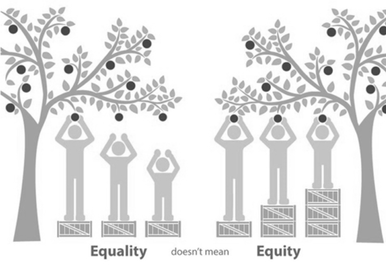|
If you are a professional or a writer who is passionate about health, racial, and social equity, consider contributing to our blog! Visit our Volunteer page to learn more. |
|
by Bree Bode and Friso van Reesema  Policy change has the ability to impact health and social outcomes during pandemics such as this unprecedented COVID-19 outbreak. As we know, the COVID-19 pandemic does not discriminate on the basis of geography or whether or not someone has a home where they can shelter-in-place. Rates of infection have been concerning both across urban and rural areas, including New York City and its suburbs, and rural areas in Louisiana, as well as international settings such as Lombardy, Italy. Reducing exposure to COVID-19 is critical to limit infections. As recommended by public health and medical experts, exposure to the virus can be reduced by closing schools, limiting operations of or closing non-essential services, staying home (if you have one) and practicing social distancing. In addition, fair public policies are essential for managing hospitals, COVID-19 testing, and the utilization of ventilators for patients in Intensive Care Units (ICUs). The Families First Coronavirus Response Act (FFCRA) includes an Employee Paid Sick Leave Rights provision. Yet, due to the economic disruption COVID-19 has caused, such a provision is insufficient to address ongoing financial insecurities faced by employees—whether they qualify or not for FFCRA benefits. In fact, the FFCRA and the related Paid Sick Leave legislation further expose a variety of health and social inequities that are concerning. Namely, FFCRA does not meet the needs of people who are historically and disproportionately impacted by poverty, which often goes hand in hand with low or no health insurance coverage (1,2). People who don’t qualify for FFCRA benefits and are also disproportionately impacted by poverty are likely to feel challenged by any potential decision of staying home, and reducing exposure, and instead may feel they should go to work, where unfortunately, their risk for contracting COVID-19 would increase. While COVID-19 has propelled paid sick leave policy to the forefront of outbreak control and management, the FFCRA may be leaving out vital workers who interact with the public as front line workers, because it only covers businesses that employ 50 people or more, but less than 500. These vital workers should also have the opportunity to stay home without suffering any financial distress. Ultimately, people should not be choosing between protecting themselves and others, and putting food on the table. For example, recent reports showcase that service employees continue to work while they are sick, citing job loss or lost wages as their reason to report to work (3,4).
Historically, Paid Sick Leave benefits, now mandated by FFCRA, have been more supportive of eligible beneficiaries in the higher wage earners category (5). According to the U.S. Bureau of Labor and Statistics about 38% of the population did not have access to Paid Sick Leave prior to the COVID-19 pandemic (6). Thereby, some 32 million employees typically fell short of receiving necessary benefits of paid sick days regardless of the COVID-19 pandemic (7,8). Workers in this category often include food service workers (i.e. those who work for small grocery stores and restaurants), pharmacy workers, as well as home caregivers supporting the elderly and other people who cannot be home alone. The new Families First Coronavirus Act does not cover employees who are paid cash or people who are consultants, and neither employees at companies with over 500 or with under 50 employees. This group is comprised primarily of workers from communities of color, women, and other low-income communities. Moreover, only twelve states offer paid sick leave (usually up to seven days). Across these twelve states, the policy parameters differ slightly, but it is common that for every 30 hours an employee works he/she can earn one hour of paid sick leave within the fiscal year (9). Some states require more hours worked for hours earned in paid sick leave, and other states do not require businesses with 50 employees or less to participate at all in providing paid sick leave benefits (9). It is estimated that even under the new FFCRA paid sick leave provisions, as many as 12% of, or up to 19 million workers from the private sector will be excluded from the benefit (10,11). Inequities in access to paid leave also affect access to healthcare and overall healthcare costs. For example, consider the cost of annual emergency department (ED) visits that result in no need for emergent treatment which ranges around $8.3 billion per year (12). The majority of ED visits are related to individuals who are essential workers and/or low-income wage earners and have limited access to preventive care and paid sick leave (13). Now think about how those 8.3 billion dollars could be redirected at the local level to help with COVID-19 response or to promote community well-being. If such $8.3 billion were added to the Families First Coronavirus Act to expand paid sick leave provisions to more workers, the paid leave gap for low-income wage earners would be substantially reduced and ultimately prevent essential workers from having to choose between attending to basic needs (e.g., food and rent) and having to risk their lives because they have to go to work. Moreover, routine COVID-19 testing should be implemented for all essential workers to make sure they are healthy, able to protect themselves and others, and stay home if needed. Policy change has the ability to impact the health of the public and enable timely and sufficient responses to emerging needs in unprecedented times such as COVID-19. What type of advocacy and action steps would you like to see in response to the COVID-19 pandemic? Do you know of any friends or family who are not being covered under current paid sick leave policies? How can we develop a new social norm that always supports the livelihood of essential workers to the extent that it is required? Contact us and let us know. We want to hear from you. Picture credit: https://picspree.com/en/photos/cashier-with-a-bag-of-groceries-1098221 References 1) Artiga, S., Orgera, K., & Damico, A. (2020, March). Changes in Health Coverage by Race and Ethnicity since the ACA, 2010-2018. Retrieved April 2020, from https://www.kff.org/disparities-policy/issue-brief/changes-in-health-coverage-by-race-and-ethnicity-since-the-aca-2010-2018/ 2) Boesch, D., Glynn, S. J., & Phadke, S. (2020, March 18). Lack of Paid Leave Risks Public Health During the Coronavirus Outbreak. Retrieved April 2020, from https://www.americanprogress.org/issues/women/news/2020/03/12/481609/lack-paid-leave-risks-public-health-coronavirus-outbreak/ 3) Ziebarth, N, R. & Pichler, S. (2019). "Labor Market Effects of U.S. Sick Pay Mandates." Employment Research 26(1): 4-6. https://doi.org/10.17848/1075-8445.26(1)-2 4) “Your Health – Your Environment Blog.” Centers for Disease Control and Prevention, Centers for Disease Control and Prevention, 12AD, blogs.cdc.gov/yourhealthyourenvironment/2016/12/05/food-workers-working-while-sick/. 5) Latest Releases. (2019). Retrieved April 2020, from https://www.bls.gov/news.release/ 6) “Employee Benefits in the United States Summary.” U.S. Bureau of Labor Statistics, U.S. Bureau of Labor Statistics, 20 Sept. 2019, www.bls.gov/news.release/ebs2.nr0.htm. 7) DeSilver, Drew. “As Coronavirus Spreads, Which U.S. Workers Have Paid Sick Leave – and Which Don't?” Pew Research Center, Pew Research Center, 12 Mar. 2020, www.pewresearch.org/fact-tank/2020/03/12/as-coronavirus-spreads-which-u-s-workers-have-paid-sick-leave-and-which-dont/. 8) Quick Facts. (2019). Retrieved 2020, from http://www.paidsickdays.org/research-resources/quick-facts.html 9) Midwest New Media. (2020). Workplace Fairness. Retrieved April 2020, from https://www.workplacefairness.org/paid-sick-leave 10) Table 6. Selected paid leave benefits: Access. (2019, September 20). Retrieved April 2020, from https://www.bls.gov/news.release/ebs2.t06.htm 11) Economic Policy Institute (2020). Senate coronavirus bill is crucial—but it’s a fraction of what’s needed, March 18, 2020. Retrieved in April 2020: https://www.epi.org/blog/senate-coronavirus-bill-is-crucial-but-its-a-fraction-of-whats-needed/ 12) Reese, E. C., Daly, R., Akroyd, G., Mulvany, C., Fifer, J. J., Kelly, W. N., … Ccs. (2019). HFMA. Retrieved April 6, 2020, from https://www.hfma.org/ 13) Chartbook on Care Coordination. (2018.). Retrieved from https://www.ahrq.gov/research/findings/nhqrdr/chartbooks/carecoordination/measure2.html About the authors Bree Bode, MPH, is an Advanced PhD student at Wayne State University. She joined the volunteer member steering committee of Health Equity Initiative recently in March 2020, where she serves as Co-Chair of the Professional Development Member Committee. Bree’s research interests focus on factors influencing food choices to advance equitable policies, systems, and environments for individuals challenged by the food insecurity-obesity paradox. Read Bree's full bio. Friso van Reesema, MBA, MPH, serves on the Board of Directors of Health Equity Initiative since June 2016, more recently as the Board Secretary. Friso is VP, Managed Care Strategy and Sales for CipherHealth - focused on Managed Medicaid and Medicare. Friso supports patient-centered approaches to designing experiences in healthcare that include health equity. Read Friso’s full bio.
13 Comments
8/26/2021 04:10:31 pm
Thanks for this amazing blog, I really like your method, keep it up.
Reply
9/1/2021 08:17:20 am
My question on my mind were answered. Thank you very much!
Reply
9/4/2021 10:05:36 am
The overall health of your business is a priority, so you require a health insurance plan that keeps your employees safe and healthy. It’s important to choose a carrier that offers the products, access, and benefits you’re looking for, who also looks out for you.
Reply
11/9/2021 11:49:55 pm
Spot on with this write-up, I truly believe that this amazing site needs far more attention. I’ll probably be back again to read more, thanks for the advice!
Reply
1/18/2022 01:59:27 am
With or without pandemic, paid sick leaves has a big impact on health especially for both employee and employers. Thank you for this post.
Reply
2/2/2022 07:27:13 am
You got my attention when you said that unequities in the approach to paid leave also change access to healthcare and overall healthcare costs. We have 35 good employees in my business. I will make sure they will be given the best retirement and health plans because they deserve it. I will consult with Employer Benefit Services to make sure that everything is smoothly handled.
Reply
4/16/2023 03:09:26 pm
How can paid sick leave policies impact health equity, particularly for low-income workers and workers in marginalized communities?
Reply
4/17/2023 10:20:00 pm
Great blog! The discussion on paid sick leave policy and its impact on health equity is crucial. It's clear that paid sick leave not only benefits employees by providing them with the necessary time off to recover from illness, but it also plays a significant role in promoting health equity by ensuring that individuals from all socio-economic backgrounds have access to this essential benefit. It's essential to advocate for inclusive paid sick leave policies that prioritize the well-being of employees, especially those from marginalized communities, as it can have a positive ripple effect on their health outcomes and overall equity in the workplace. Kudos to the author for shedding light on this important topic!
Reply
5/9/2023 02:33:07 pm
I love all your blog articles, It’s especially helpful for people starting out, like me! It’s nice to have a blog to follow that’s so informative. PCS Safety, Inc. specializes in the fields of Executive Recruitment & Staffing, Human Resources Development and Program Implementation, Workplace Safety Development and OSHA Compliance Programs.
Reply
5/9/2023 03:08:50 pm
Thank you so much for sharing all this wonderful info with the how-to's!!!! It is so appreciated!!!” “You always have good humor in your posts/blogs. So much fun and easy to read! We are PCS Safety, Inc. specializes in the fields of Executive Recruitment & Staffing, Human Resources Development and Program Implementation, Workplace Safety Development and OSHA Compliance Programs.
Reply
12/5/2023 08:31:02 pm
The Health Equity Blog is a treasure trove of information and stories that touch the heart. It's essential to have platforms like this to shed light on the critical issue of health equity. The cross-sectoral efforts and partnerships mentioned here provide valuable insights into how we can make progress in this area.
Reply
Leave a Reply. |
Archives
June 2023
CategoriesEditors:
Renata Schiavo, PhD, MA, CCL Alka Mansukhani, PhD, MS Radhika Ramesh, MA Guest posts are by invitation only. |



 RSS Feed
RSS Feed
